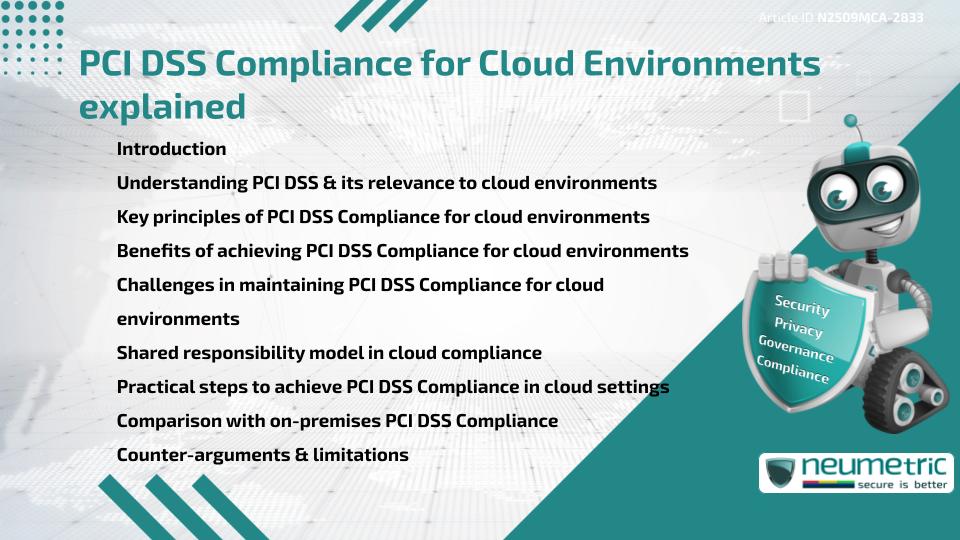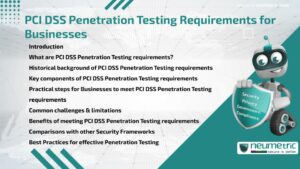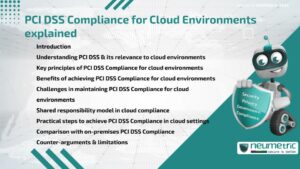Table of Contents
ToggleIntroduction
The PCI DSS Compliance for cloud environments is critical for businesses that store, process or transmit Cardholder Data in the cloud. The Payment Card Industry Data Security Standard [PCI DSS] sets global security requirements designed to safeguard Sensitive Payment Data. As cloud adoption accelerates, Organisations must adapt compliance strategies to shared responsibility models & virtualized infrastructures. Understanding the PCI DSS Compliance for cloud environments ensures that businesses can reduce Risks, build Customer confidence & avoid severe penalties.
Understanding PCI DSS & its relevance to cloud environments
PCI DSS was established by major card brands such as Visa, MasterCard & American Express to protect Cardholder Information. Traditionally focused on on-premises infrastructures, it now extends to cloud environments where Organisations leverage Infrastructure as a Service [IaaS], Platform as a Service [PaaS], or Software as a Service [SaaS]. Businesses using these models must align their cloud architecture with PCI DSS controls. For more background, see the PCI Security Standards Council.
Key principles of PCI DSS Compliance for cloud environments
The standard’s principles include:
- Building & maintaining secure networks to protect data from breaches.
- Protecting Cardholder Data during storage & transmission.
- Maintaining Vulnerability management programs to address Threats.
- Implementing strong Access Control measures to ensure only authorized individuals access Sensitive Data.
- Monitoring & testing networks to detect & address weaknesses.
- Maintaining an Information Security Policy that aligns with compliance goals.
These apply equally to cloud-based systems but require adaptations for shared infrastructures. More details are available at the Cloud Security Alliance.
Benefits of achieving PCI DSS Compliance for cloud environments
Compliance offers several advantages:
- Enhanced security of sensitive Cardholder Data.
- Increased trust & confidence from Customers & partners.
- Reduced Risk of costly breaches & regulatory fines.
- Competitive differentiation in industries handling Financial transactions.
- Improved Governance & Risk Management processes.
Further information on compliance benefits can be found at Cybersecurity & Infrastructure Security Agency.
Challenges in maintaining PCI DSS Compliance for cloud environments
Organisations face several challenges, including:
- Complexity of mapping PCI DSS controls to cloud service providers.
- Limited visibility into Vendor infrastructure & configurations.
- Multi-tenancy Risks when using shared cloud resources.
- Difficulty in Continuous Monitoring & compliance validation.
These issues require careful planning & collaboration with cloud providers. Guidance on overcoming challenges can be found through SANS Institute.
Shared responsibility model in cloud compliance
A key concept for PCI DSS Compliance for cloud environments is the shared responsibility model. In IaaS, the cloud provider manages the physical infrastructure, while the organisation is responsible for securing applications, systems & data. In SaaS, the provider takes on more responsibility, but Customers must still ensure secure access & User management. Understanding these boundaries is essential for compliance success.
Practical steps to achieve PCI DSS Compliance in cloud settings
Businesses can take the following actions:
- Identify & document the Cardholder Data environment [CDE].
- Determine roles & responsibilities between provider & Customer.
- Implement encryption for stored & transmitted data.
- Configure firewalls & intrusion detection tools within the cloud.
- Conduct regular Vulnerability assessments & Penetration Testing.
- Train staff on cloud-specific Compliance Requirements.
Step-by-step resources are also available in the National Institute of Standards & Technology guidelines.
Comparison with on-premises PCI DSS Compliance
On-premises environments provide full visibility & control but require significant investment in infrastructure & maintenance. Cloud environments, in contrast, offer scalability & cost efficiency but rely heavily on Vendor transparency. Achieving compliance in the cloud requires adapting traditional practices to virtualized & distributed infrastructures.
Counter-arguments & limitations
Some experts argue that PCI DSS Compliance for cloud environments is overly complex & resource-intensive, especially for Small Businesses. Others caution that achieving compliance does not guarantee absolute security, as Cyber Threats evolve continuously. Nevertheless, PCI DSS remains an essential Framework for protecting Cardholder Data.
Conclusion
The PCI DSS Compliance for cloud environments is vital for businesses handling payment information. By understanding shared responsibilities, addressing unique challenges & following practical steps, Organisations can strengthen security, achieve compliance & protect Customer Trust.
Takeaways
- PCI DSS defines global requirements for protecting payment data.
- Cloud environments require adapting traditional compliance methods.
- Shared responsibility models are central to achieving compliance.
- Benefits include stronger security, trust & competitive advantage.
- Compliance is challenging but essential for Risk Management.
FAQ
What is PCI DSS Compliance for cloud environments?
It is the application of PCI DSS security Standards to cloud infrastructures to ensure Cardholder Data is protected.
Who enforces PCI DSS Compliance?
The PCI Security Standards Council oversees the standard, while enforcement is managed by payment card brands.
How is compliance different in the cloud compared to on-premises?
Cloud compliance requires understanding shared responsibility with providers, unlike on-premises where the business controls everything.
Do all cloud service models require PCI DSS Compliance?
Yes, whether using IaaS, PaaS or SaaS, compliance applies if Cardholder Data is stored, processed or transmitted.
What role do cloud providers play in compliance?
They secure infrastructure layers, but businesses must manage applications, access & Data Security.
Can Small Businesses achieve PCI DSS Compliance for cloud environments?
Yes, though it may be challenging. Leveraging cloud provider tools & phased implementation can help.
Does PCI DSS Compliance guarantee Data Security?
No, compliance reduces Risks but cannot eliminate all security Threats.
Need help for Security, Privacy, Governance & VAPT?
Neumetric provides organisations the necessary help to achieve their Cybersecurity, Compliance, Governance, Privacy, Certifications & Pentesting needs.
Organisations & Businesses, specifically those which provide SaaS & AI Solutions in the Fintech, BFSI & other regulated sectors, usually need a Cybersecurity Partner for meeting & maintaining the ongoing Security & Privacy needs & requirements of their Enterprise Clients & Privacy conscious Customers.
SOC 2, ISO 27001, ISO 42001, NIST, HIPAA, HECVAT, EU GDPR are some of the Frameworks that are served by Fusion – a SaaS, multimodular, multitenant, centralised, automated, Cybersecurity & Compliance Management system.
Neumetric also provides Expert Services for technical security which covers VAPT for Web Applications, APIs, iOS & Android Mobile Apps, Security Testing for AWS & other Cloud Environments & Cloud Infrastructure & other similar scopes.
Reach out to us by Email or filling out the Contact Form…





